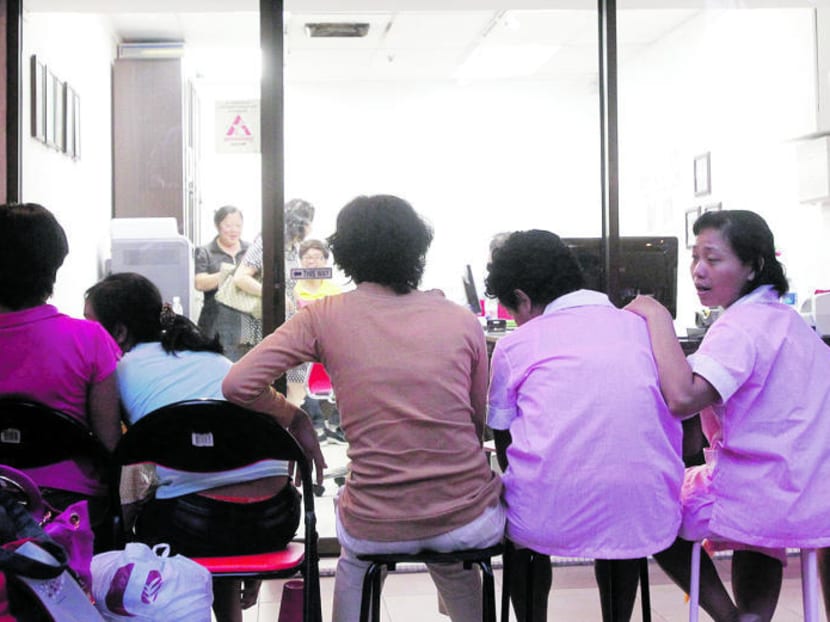Foreign domestic workers in Singapore seek help most for overwork, verbal abuse, pay-related problems: Report
SINGAPORE — They were overworked, suffered verbal abuse and were caught in salary-related disputes. These were the top three problems that foreign domestic workers (FDWs) reported when they sought refuge at a shelter run by the Humanitarian Organisation for Migration Economics (Home).
SINGAPORE — They were overworked, suffered verbal abuse and were caught in salary-related disputes.
These were the top three problems that foreign domestic workers (FDWs) reported when they sought refuge at a shelter run by the Humanitarian Organisation for Migration Economics (Home).
The charity help group for migrant workers disclosed these findings on Tuesday (Jan 15) in a report that examined the issue of forced labour among FDWs in Singapore.
The report — which was co-authored with Hong Kong-based anti-human trafficking organisation Liberty Shared — also made several recommendations, such as extending the Employment Act to these workers and giving them the right to freely switch employers with clearly defined notice periods.
However, the Ministry of Manpower (MOM) rebutted the findings, saying that it “does not accurately reflect the employment and working conditions of FDWs in Singapore”.
While FDWs are not covered under the Employment Act, the ministry pointed out that they get legal protection under the Employment of Foreign Manpower Act, and that “only a very small number of FDWs may run away from their employers”.
Even so, Home noted in its report that the "ambiguous language" of the provisions under the Employment of Foreign Manpower Act leaves FDWs vulnerable to abuse.
From April 2017 to March 2018, 872 FDWs — or an average of 17 such workers every week — sought help at the Home shelter.
Nearly half of them were from the Philippines, followed by Indonesia and Myanmar.
Their top complaint was working excessive hours, clocking in more than 12 hours daily in general.
Many FDWs who sought help from Home did not have weekly rest days, Home said, and commonly reported working between 16 and 18 hours a day.
Home also received regular complaints that FDWs were being asked to do work for another household or to work in the employer’s business — a violation of the Employment of Foreign Manpower Act.
As for verbal abuse, these workers reported that employers shout at them, call them names and harass them by making sexually-loaded insults.
Other top complaints include getting inadequate or poor quality food and issues related to their pay.
One problem highlighted by the report was the “protracted and unpredictable” investigation process into physical or sexual abuse cases, where a migrant worker’s passport can be impounded by the police.
The group is now housing one of two FDWs employed by Tay Wee Kiat and Chia Yun Ling, who abused their helpers and whose landmark appeal last year led to a sentencing framework being set out for such cases. Their case involving the second domestic worker has not concluded after five years, Home said.
The MOM said that the majority of FDWs who ran away from their employers did so because of misunderstandings, while those who were abused “are an even smaller minority”.
Its 2015 survey of 1,000 FDWs found that 97 per cent of the respondents were satisfied working in Singapore, while three-quarters intended to continue working here after completing their contract.
“Notwithstanding, MOM is happy to continue further discussions with Home and other stakeholders on the recommendations and continually improve our protection for FDWs,” the ministry added.
THE ISSUE OF FORCED LABOUR
Another pertinent issue highlighted by Home’s report is that many FDWs who seek help at its shelter experience “conditions akin to forced labour”.
The International Labour Organisation (ILO), of which Singapore is a member, defines forced labour as “all work or service which is exacted from any person under the menace of any penalty, for which the person has not offered himself or herself voluntarily”.
Home cited several cases as examples to illustrate forced labour, such as an FDW with the pseudonym Indah who stayed in the shelter in 2017.
She worked for an employer who withheld more than S$40,000 of her salary for nearly 10 years. She was also not allowed to own a mobile phone, and could not speak to her family for almost seven years.
Among its recommendations, Home said that Singapore should amend the Prevention of Human Trafficking Act to ensure it fully complies with the United Nations’ Protocol to Prevent, Suppress and Punish Trafficking in Persons.
The group claimed that “forced labour” and “exploitation” are not fully defined in the Act, which impedes coordinates attempts to deal with them.
However, the MOM said that the Act is aligned with the protocol, which Singapore ratified in 2016.
The ministry added: “It is also important to recognise that forced labour is a complex issue. Meeting one or more of the ILO’s forced labour indicators may not necessarily mean that a worker is indeed in a forced labour situation, as each case needs to be assessed based on the facts.”









